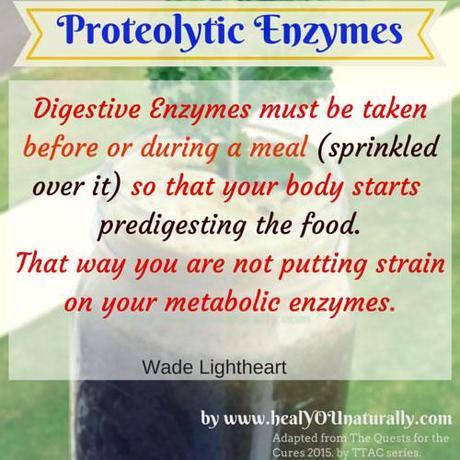 Digestive Enzymes are incredibly important in the process of digestion. Saliva, fruits and vegetables contain enzymes that help us digest foods. However, since our processed foods were introduced those digestive enzymes became less and less present in our foods. That being said, if you follow a raw food diet, you are ahead of the game (kudos).
Digestive Enzymes are incredibly important in the process of digestion. Saliva, fruits and vegetables contain enzymes that help us digest foods. However, since our processed foods were introduced those digestive enzymes became less and less present in our foods. That being said, if you follow a raw food diet, you are ahead of the game (kudos).
According to Wade lightheart 3-Time Canadian Natural Bodybuilding Champion, is one of the world's premier authorities on Natural Nutrition and Training Methods. He stresses on the importance of enzyme in your diet, especially when consuming a variety of cooked meals- as most of us do.
In his article The Importance of Enzymes in Your Diet in Your Diet. Wade says:
Research has shown that any food that is heated above 118 degrees loses all of its enzymes. In other words all cooked food is deficient in digestive enzymes.
Processed foods, irradiated foods, foods grown with pesticides, chemical fertilizers, or on mineral deficient soils all have minute levels of enzymes that occur naturally.
Our bodies are actually designed to recognize the taste of enzyme and nutrient dense foods by seeking foods that break down easily, and taste sweet. Anyone who has eaten a vegetable or fruit at an organic garden or farm will quickly attest to how different organically grown enzyme rich foods taste.
Digestive enzymes are enzymes that break down food into usable material. The major different types of digestive enzymes are:
amylase - breaks down carbohydrates, starches, and sugars which are prevalent in potatoes, fruits, vegetables, and many snack foods
* lactase - breaks down lactose (milk sugars)
* diastase - digests vegetable starch
* sucrase - digests complex sugars and starches
* maltase - digests disaccharides to monosaccharides (malt sugars)
* invertase - breaks down sucrose (table sugar)
* glucoamylase - breaks down starch to glucose
* alpha-glactosidase - facilitates digestion of beans, legumes, seeds,
roots, soy products, and underground stems
* protease - breaks down proteins found in meats, nuts, eggs, and cheese
* pepsin - breaks down proteins into peptides
* peptidase - breaks down small peptide proteins to amino acids
* trypsin - derived from animal pancreas, breaks down proteins
* alpha - chymotrypsin, an animal-derived enzyme, breaks down proteins
* bromelain - derived from pineapple, breaks down a broad spectrum of proteins, has anti-inflammatory properties, effective over very wide pH range
* papain - derived from raw papaya, broad range of substrates and pH, works well breaking down small and large proteins
* lipase - breaks down fats found in most dairy products, nuts, oils, and meat
* cellulase - breaks down cellulose, plant fiber; not found in humans
Read the rest of the orginal article on enzymes here
Adding enzymes to your smoothies, or snacks is a great way to add enzymes to your diet. However, the best time to take enzymes supplements are before and during a meal (sprinkled over it) in order to help the body predigest the foods.
Wade lighheart makes really good enzymes and you can visit his website to get them. However, If you are looking to supplement enzymes that are great and a bit more affordable here are the enzymes i use.

